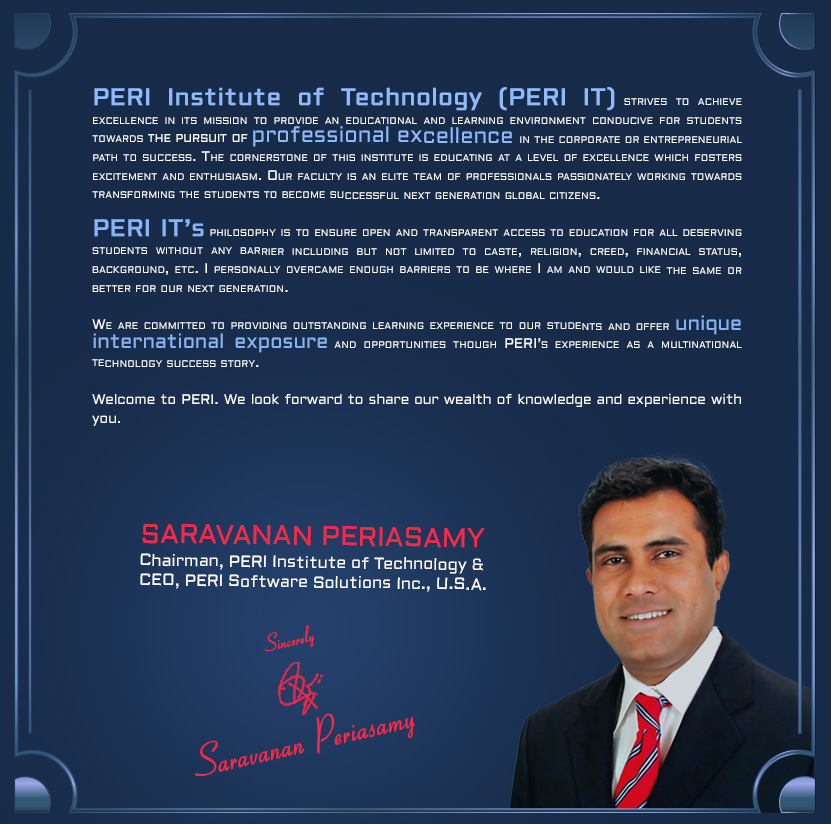M.E. Applied Electronics

The Applied Electronics program teaches students the technical background and practical skills necessary for careers in the installation, maintenance, support and troubleshooting of electronics, telecommunications and computer technology based systems and equipment. The program is structured to provide students with application-oriented electronic/electrical ibackground, extensive hands-on laboratory experience and the use of standard and specialized test equipment. The latest & most relevant knowledge, skills and competencies including practical experience is a core part of our curriculum.
The scope of applied electronics engineering is vast and growing, in part due to the increased use of automatic control in manufacturing and process plants and in part to the development of more accurate & robust sensors.
Course Syllabus
PERI IT follows the Anna University syllabus for affiliated colleges. Click on the appropriate semester to view the syllabus. The complete syllabus can be downloaded here.
| SL. No. | Course Code | Course Title | L | T | P | C |
|---|---|---|---|---|---|---|
| THEORY | ||||||
| 1 | MA7157 | Applied Mathematics for Electronics Engineers | 3 | 1 | 0 | 4 |
| 2 | AP7101 | Advanced Digital Signal Processing | 3 | 1 | 0 | 4 |
| 3 | AP7102 | Advanced Digital Logic System Design | 3 | 0 | 0 | 3 |
| 4 | AP7103 | Advanced Microprocessor and Microcontroller | 3 | 0 | 0 | 3 |
| 5 | Elective I | 3 | 0 | 0 | 3 | |
| 6 | Elective II | 3 | 0 | 0 | 3 | |
| PRACTICAL | ||||||
| 7 | AP7111 | Electronics System Design Laboratory I | 0 | 0 | 3 | 2 |
| TOTAL | 18 | 1 | 6 | 22 | ||
| SL. No. | Course Code | Course Title | L | T | P | C |
|---|---|---|---|---|---|---|
| THEORY | ||||||
| 1 | AP7201 | Analysis and Design of Analog Integrated Circuits | 3 | 0 | 0 | 3 |
| 2 | AP7202 | ASIC and FPGA Design | 3 | 0 | 0 | 3 |
| 3 | AP7203 | Embedded Systems | 3 | 0 | 0 | 3 |
| 4 | CP7103 | Multicore Architectures | 3 | 0 | 0 | 3 |
| 5 | Elective III | 3 | 0 | 0 | 3 | |
| 6 | Elective IV | 3 | 0 | 0 | 3 | |
| PRACTICAL | ||||||
| 7 | AP7211 | Electronics System Design Laboratory II | 0 | 0 | 3 | 2 |
| TOTAL | 18 | 0 | 3 | 20 | ||
| SL. No. | Course Code | Course Title | L | T | P | C |
|---|---|---|---|---|---|---|
| THEORY | ||||||
| 1 | AP7301 | Electromagnetic Interference and Compatibility | 3 | 0 | 0 | 3 |
| 2 | Elective V | 3 | 0 | 0 | 3 | |
| 3 | Elective VI | 3 | 0 | 0 | 3 | |
| PRACTICAL | ||||||
| 4 | AP7311 | Project Work (Phase I) | 0 | 0 | 12 | 6 |
| TOTAL | 9 | 0 | 12 | 15 | ||
| SL. No. | Course Code | Course Title | L | T | P | C |
|---|---|---|---|---|---|---|
| PRACTICAL | ||||||
| 1 | AP7411 | Project Work ( Phase II) | 0 | 0 | 24 | 12 |
| TOTAL | 0 | 0 | 24 | 12 | ||
| SL. No. | Course Code | Course Title | L | T | P | C |
|---|---|---|---|---|---|---|
| ELECTIVE I | ||||||
| 1 | DS7201 | Advanced Digital Image Processing | 3 | 0 | 0 | 3 |
| 2 | CU7006 | Wavelet Transforms and Applications | 3 | 0 | 0 | 3 |
| 3 | IF7301 | Soft Computing | 3 | 0 | 0 | 3 |
| 4 | AP7001 | Computer Architecture and Parallel Processing | 3 | 0 | 0 | 3 |
| 5 | AP7002 | Three Dimensional Network on Chip | 3 | 0 | 0 | 3 |
| ELECTIVE II | ||||||
| 6 | VL7201 | CAD for VLSI Circuits | 3 | 0 | 0 | 3 |
| 7 | AP7003 | Digital Control Engineering | 3 | 0 | 0 | 3 |
| 8 | AP7004 | Hardware - Software Co Design | 3 | 0 | 0 | 3 |
| 9 | AP7005 | Quantum Electronics | 3 | 0 | 0 | 3 |
| 10 | AP7006 | Sensors and Signal Conditioning | 3 | 0 | 0 | 3 |
| ELECTIVE III | ||||||
| 11 | VL7102 | VLSI Design Techniques | 3 | 0 | 0 | 3 |
| 12 | VL7202 | Low Power VLSI Design | 3 | 0 | 0 | 3 |
| 13 | AP7007 | Fiber Optic Sensors | 3 | 0 | 0 | 3 |
| 14 | AP7008 | DSP Integrated Circuits | 3 | 0 | 0 | 3 |
| 15 | AP7009 | RF System Design | 3 | 0 | 0 | 3 |
| 16 | VL7001 | Analog and Mixed Mode VLSI Design | 3 | 0 | 0 | 3 |
| ELECTIVE IV | ||||||
| 17 | VL7006 | Analog VLSI Design | 3 | 0 | 0 | 3 |
| 18 | VL7005 | Physical Design of VLSI Circuits | 3 | 0 | 0 | 3 |
| 19 | VL7101 | VLSI Signal Processing | 3 | 0 | 0 | 3 |
| 20 | AP7010 | Data Converters | 3 | 0 | 0 | 3 |
| 21 | VL7103 | Solid State Device Modeling and Simulation | 3 | 0 | 0 | 3 |
| 22 | NC7101 | High Performance Networks | 3 | 0 | 0 | 3 |
| ELECTIVE V | ||||||
| 23 | VL7301 | Testing of VLSI Circuits | 3 | 0 | 0 | 3 |
| 24 | VL7013 | VLSI for Wireless Communication | 3 | 0 | 0 | 3 |
| 25 | AP7011 | Photonics | 3 | 0 | 0 | 3 |
| 26 | AP7012 | Nano Electronics | 3 | 0 | 0 | 3 |
| 27 | AP7013 | Pattern Recognition | 3 | 0 | 0 | 3 |
| 28 | AP7014 | Optical Computing | 3 | 0 | 0 | 3 |
| ELECTIVE VI | ||||||
| 29 | CP7030 | Robotics | 3 | 0 | 0 | 3 |
| 30 | AP7015 | Optical Imaging Techniques | 3 | 0 | 0 | 3 |
| 31 | CU7002 | MEMS and NEMS | 3 | 0 | 0 | 3 |
| 32 | DS7301 | Speech and Audio Signal Processing | 3 | 0 | 0 | 3 |
| 33 | AP7016 | System on Chip Design | 3 | 0 | 0 | 3 |
| 34 | CP7023 | Reconfigurable Computing | 3 | 0 | 0 | 3 |
| 35 | NC7202 | Wireless Adhoc and Senor Networks | 3 | 0 | 0 | 3 |
Laboratories
Classroom learning is complemented by practicals in PERI IT's several well equipped laboratories such as Engineering Practices Lab, Electronic Circuits Lab, Digital Lab, Linear Integrated Circuits Lab, Microprocessor & Microcontroller Lab, Digital Signal Processing Lab, Electronic Design Lab, VLSI Lab etc.
Additional Educative Activities
We train the students to improve their ability and fine tune their skills at both practical and theoretical level to help them get placed in reputed industries across the globe. Additional coaching is also provided to the students to equip themselves to appear for competitive exams like GATE/GRE and TOEFL.
SIBILABO (meaning: Signals in Latin), the department association periodically conducts guest lectures and seminars. Through this association we arrange industrial visits based on the curriculum. Students and faculty members are encouraged to attend symposia, workshops, conferences and development programs quite frequently to improve their knowledge and to get exposure in the relevant fields.




